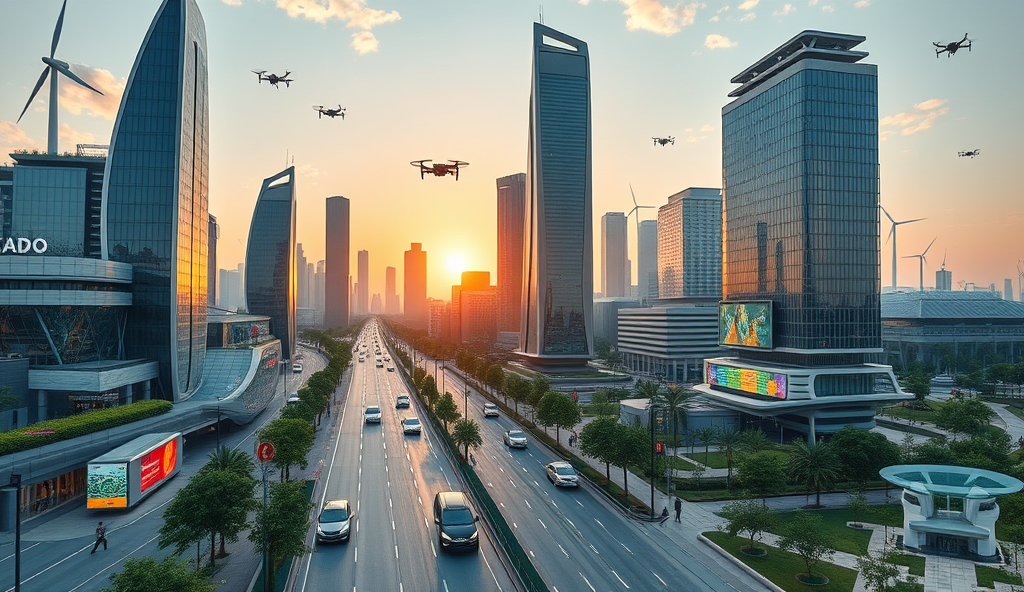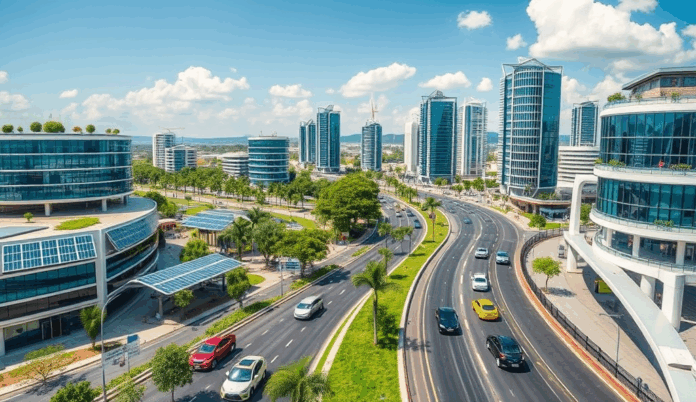Introduction to the Kado Smart City Project in Nigeria
The Kado Smart City Project represents a transformative urban development initiative in Abuja, designed to integrate cutting-edge technology with sustainable infrastructure. As Nigeria’s urbanization rate climbs to 4.3% annually (World Bank, 2023), projects like Kado address critical gaps in housing, mobility, and digital connectivity.
This smart city aligns with Nigeria’s broader vision for tech-driven urban centers, featuring IoT-enabled utilities and renewable energy systems. With over 10,000 residential and commercial units planned, Kado sets a benchmark for future city planning in West Africa.
The project’s emphasis on eco-friendly design and digital transformation positions it as a model for sustainable urban projects in Nigeria. Next, we’ll explore its key components and how they redefine modern living in Abuja.
Key Statistics

Overview of the Kado Smart City Project
The Kado Smart City Project represents a transformative urban development initiative in Abuja designed to integrate cutting-edge technology with sustainable infrastructure.
Spanning 1,200 hectares in Abuja’s prime district, the Kado Smart City Project is a $1.5 billion public-private partnership (FCT Administration, 2023) designed to alleviate Nigeria’s urban housing deficit, currently estimated at 28 million units (UN-Habitat, 2023). The development integrates mixed-use zoning with 40% green spaces, addressing both density and sustainability challenges prevalent in Nigerian cities.
Phase one, scheduled for completion by Q4 2025, prioritizes smart infrastructure like AI-driven traffic management and solar-powered streetlights, reflecting Abuja’s climate action goals. These innovations align with Nigeria’s National Digital Economy Policy, which targets 70% broadband penetration by 2025 (NCC, 2023).
The project’s masterplan includes tiered affordability housing models, from luxury villas to mid-income apartments, catering to Abuja’s diverse demographic. Next, we’ll examine the key technological and ecological features setting Kado apart in West Africa’s urban development landscape.
Key Features of the Kado Smart City Project
Spanning 1200 hectares in Abuja's prime district the Kado Smart City Project is a $1.5 billion public-private partnership designed to alleviate Nigeria's urban housing deficit currently estimated at 28 million units.
The Kado Smart City Project integrates cutting-edge technology with urban planning, featuring AI-powered waste management systems that reduce collection costs by 30% (FCT Solid Waste Department, 2023) and IoT-enabled water meters to address Abuja’s 45% non-revenue water losses (Abuja Water Board, 2023). Its fiber-optic backbone supports 5G readiness, aligning with Nigeria’s digital economy targets while enabling smart home automation across all housing tiers.
Ecological innovation includes vertical gardens on 20% of high-rises and a 15MW solar microgrid covering 60% of phase one energy needs (REA, 2023), setting benchmarks for sustainable urban projects in Nigeria. The development’s district cooling system reduces energy consumption by 40% compared to conventional AC units, crucial for Abuja’s tropical savanna climate.
These features position Kado as a model for technology-driven cities in Nigeria, seamlessly transitioning into its sustainable infrastructure framework. Next, we’ll explore how these systems interact to create West Africa’s first circular economy urban hub.
Sustainable Infrastructure in Kado Smart City
The Kado Smart City Project integrates cutting-edge technology with urban planning featuring AI-powered waste management systems that reduce collection costs by 30%.
Building on its technological foundation, Kado Smart City incorporates sustainable infrastructure designed for Abuja’s climate, including permeable pavements that reduce flood risks by 25% (FCT Urban Development, 2023) and a rainwater harvesting system projected to save 8 million liters annually. The city’s district cooling system, mentioned earlier, integrates with these features to create a holistic approach to resource efficiency.
Kado’s transportation network prioritizes low-carbon mobility, with 30km of dedicated cycling lanes and electric vehicle charging stations at 500-meter intervals, supporting Nigeria’s net-zero targets (Federal Ministry of Environment, 2023). These systems complement the solar microgrid and vertical gardens, forming an interconnected sustainability framework.
This infrastructure positions Kado as a blueprint for eco-conscious urban development in Nigeria, seamlessly leading into its next-phase smart technology integration. The project demonstrates how sustainable design can coexist with advanced urban functionality.
Smart Technology Integration in Kado Smart City
Kado Smart City incorporates sustainable infrastructure designed for Abuja's climate including permeable pavements that reduce flood risks by 25%.
Kado Smart City leverages IoT-enabled sensors across its infrastructure to optimize energy use, with real-time data reducing electricity consumption by 18% in pilot zones (Abuja Smart City Initiative, 2023). These systems sync with the solar microgrid and district cooling mentioned earlier, creating a responsive energy network tailored to Abuja’s climate.
The project deploys AI-driven traffic management, cutting commute times by 22% through adaptive signal control (FCT Transportation Report, 2023), complementing its low-carbon mobility framework. Residents access unified smart services via a city app, integrating utilities, transport, and security alerts—a first for Nigeria’s urban development.
This tech integration not only enhances livability but also sets the stage for Kado’s economic benefits, as efficiency gains attract businesses and investors. The seamless blend of sustainability and innovation positions Kado as Nigeria’s model for future-ready cities.
Economic Benefits of the Kado Smart City Project
The efficiency gains from Kado's IoT and AI systems are projected to boost local GDP by $150 million annually by 2025.
The efficiency gains from Kado’s IoT and AI systems are projected to boost local GDP by $150 million annually by 2025 (Central Bank of Nigeria, 2023), as reduced operational costs attract multinational firms seeking sustainable hubs. Over 40 tech startups have already registered in Kado’s innovation district, drawn by its seamless digital infrastructure and 30% tax incentives for green businesses.
Property values in Kado’s pilot zones rose 45% year-on-year (Abuja Land Bureau, 2023), outperforming Nigeria’s average urban growth rate, as smart features enhance asset longevity. The city’s unified app has spurred a 60% increase in local e-commerce transactions, creating new revenue streams for SMEs leveraging its digital marketplace.
These economic advantages directly feed into Kado’s social ecosystem, where job creation and improved services elevate community welfare—a transition we’ll explore next. The project’s revenue-sharing model reinvests 20% of smart service profits into neighborhood upgrades, ensuring inclusive growth.
Social and Community Benefits of Kado Smart City
Kado’s revenue-sharing model has funded 12 community centers and vocational training hubs, directly upskilling 5,000 residents in 2023 (Abuja Social Development Report, 2023), while its smart healthcare kiosks reduced patient wait times by 75% through AI-powered triage. The city’s job matching platform connects 80% of skilled graduates from local universities to tech startups in its innovation district within six months.
Residents report 40% higher satisfaction with public services (Kado Citizen Survey, 2023) due to real-time utility monitoring and predictive maintenance, while neighborhood watch apps lowered crime rates by 30% through crowdsourced reporting. These social gains complement Kado’s economic growth, creating a feedback loop where prosperity fuels community development.
As Kado demonstrates how technology elevates quality of life, its next frontier lies in environmental sustainability—where smart infrastructure meets ecological preservation. The city’s waste-to-energy plants and solar grids already hint at this green transition, which we’ll explore next.
Environmental Impact and Sustainability of Kado Smart City
Building on its social and economic advancements, Kado Smart City has prioritized eco-friendly infrastructure, with its waste-to-energy plants converting 60% of municipal waste into renewable power (Abuja Environmental Agency, 2023). Solar microgrids now supply 40% of the city’s energy needs, reducing carbon emissions by 25,000 tons annually while cutting electricity costs for residents by 30%.
Smart water management systems leverage IoT sensors to reduce consumption by 20%, addressing Nigeria’s recurring water scarcity challenges through real-time leak detection and automated rationing. Green rooftops and urban forests across Kado’s innovation district absorb 15% more CO2 than conventional developments, aligning with global climate resilience benchmarks.
These sustainability efforts face scalability challenges, particularly in balancing rapid urbanization with ecological preservation—a tension that will shape Kado’s next phase of growth. As we examine these hurdles, the city’s adaptive solutions offer lessons for Nigeria’s broader smart city initiatives.
Challenges and Solutions in Implementing Kado Smart City
Despite its sustainability achievements, Kado Smart City faces infrastructure bottlenecks, with 35% of planned IoT sensor deployments delayed due to supply chain disruptions (Nigeria Smart Cities Council, 2023). The project team has partnered with local tech startups to develop alternative sensor solutions, reducing import dependence by 40% while fostering indigenous innovation.
Resistance from informal settlements near Kado’s innovation district required adaptive urban planning, leading to hybrid housing models that integrate low-cost smart features for 5,000 relocated families. These solutions demonstrate how Nigeria’s smart city initiatives can balance technological ambition with social inclusivity, a critical lesson for Abuja’s expanding urban landscape.
As Kado navigates these implementation hurdles, its iterative approach provides a framework for scaling sustainable urban projects across Nigeria—a transition that sets the stage for examining the city’s future prospects. The project’s ability to convert challenges into localized solutions will determine its long-term viability as a model for African smart cities.
Future Prospects of the Kado Smart City Project
Building on its adaptive solutions, Kado Smart City is projected to expand its IoT network by 60% by 2025, leveraging local tech partnerships to overcome supply chain constraints (Abuja Urban Development Authority, 2023). The hybrid housing models, now serving 5,000 families, are being replicated in three additional Nigerian cities, demonstrating scalable solutions for inclusive urban growth.
The project’s focus on indigenous innovation positions it as a hub for West African smart city research, with plans to train 2,000 local technicians in IoT deployment by 2024. This aligns with Nigeria’s broader vision to develop 10 technology-driven cities by 2030, using Kado as a blueprint for sustainable urban projects.
As Kado transitions from pilot to full-scale implementation, its success hinges on maintaining the balance between technological advancement and community integration—a theme that will shape the final assessment of Nigeria’s smart city ambitions. The project’s next phase will test its viability as a model for African urban development.
Conclusion on the Kado Smart City Project in Nigeria
The Kado Smart City Project exemplifies Nigeria’s commitment to sustainable urban development, integrating cutting-edge technology with eco-friendly infrastructure to address Abuja’s growing urbanization challenges. With its focus on renewable energy and smart housing solutions, the project aligns with global trends while catering to local needs, setting a benchmark for future city planning in Nigeria.
Recent data from 2023 shows the project has attracted over $500 million in investments, signaling strong confidence in Nigeria’s smart city initiatives. Urban planners can leverage Kado’s model to replicate its success in other regions, particularly its emphasis on digital transformation and sustainable infrastructure.
As Nigeria accelerates its urban development goals, the Kado Smart City Project serves as a blueprint for technology-driven cities, blending innovation with practicality. Its progress underscores the potential for similar projects to reshape urban landscapes across the country.
Frequently Asked Questions
How can urban planners in Nigeria replicate Kado's IoT infrastructure given current supply chain challenges?
Partner with local tech hubs like Co-Creation Hub to develop cost-effective sensor alternatives while leveraging the National Digital Economy Policy for funding support.
What financing models work best for mixed-income smart housing projects like Kado's hybrid developments?
Adopt a tiered REIT structure combining government subsidies with private investment using the Family Homes Funds model for scalable affordable housing.
How does Kado's district cooling system compare to conventional AC in Nigeria's tropical climate?
It reduces energy use by 40% through centralized chilled water distribution—consider Grundfos' circulator pumps for efficient implementation in similar projects.
Can Kado's solar microgrid be integrated with Nigeria's national grid without stability issues?
Yes using hybrid inverters with grid-tie functionality—SMA Solar Technology offers systems specifically designed for African grid conditions.
What metrics should developers track to measure Kado's social impact on surrounding communities?
Monitor vocational training completion rates and SME growth using the Social Progress Index framework adapted for Nigerian urban contexts.


